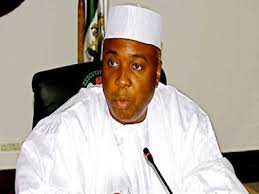 The leadership of the eighth National Assembly has assured the Presidency of its readiness to expedite actions on relevant legislations that will contribute to the country’s socio-economic and political progress.
The leadership of the eighth National Assembly has assured the Presidency of its readiness to expedite actions on relevant legislations that will contribute to the country’s socio-economic and political progress.
Senate President and Speaker of House of Representatives made the pledge in separate speeches during the opening ceremony of the National Assembly Dialogue on Economy, Security and Development in Abuja, organised by the National Institute for Legislative Studies (NILS).
Senate President Bukola Saraki, who was represented by the Deputy Senate President Ike Ekweremadu, said that the National Assembly was determined to address factors that had led to poor governance in the country over the years. Saraki noted that such factors as weak regulatory framework, obsolete laws and poor governance that had contributed to slowing down the country’s growth and development would be adequately addressed by the eighth legislative set.
The legislature, he said, “would continue to contribute to an economic reform agenda aimed at expanding economic space for business, private sector involvement in infrastructure development as well as consumers’ rights protection”.
According to the Senate President, the National Assembly would pursue budget reform bill, ecological funds utilisation bill, Excess Crude Account Management Bill, Executive Bodies Independent Protection Law Bill, Federal Account Accountability and Transparency Act. Other important legislation to be addressed includes, the National Assembly Budget Research Bill, Police Reform Bill, Justice Reform Bill, Criminal Procedure Law Amendment Bill and Whistle Blowers Protection Bill.
 On his part, Yakubu Dogara, Speaker, House of Representatives urged President Muhammadu Buhari to as a matter of urgency transmit a new Petroleum Industry Bill (PIB) to the parliament for consideration and passage into law. He described the PIB as one of the most important pieces of legislation that should be quickly considered and passed in the interest of the economy.
On his part, Yakubu Dogara, Speaker, House of Representatives urged President Muhammadu Buhari to as a matter of urgency transmit a new Petroleum Industry Bill (PIB) to the parliament for consideration and passage into law. He described the PIB as one of the most important pieces of legislation that should be quickly considered and passed in the interest of the economy.
Dogara, noted that immediate transmission of a new PIB to the National Assembly had “become even more compelling because oil and gas still accounts for over 70 per cent of the country’s foreign exchange earnings in spite of rapid drop in oil prices.”
He noted that although efforts in the past to pass the bill failed, the Eighth National Assembly was ready to speedily pass the bill to reposition the petroleum industry.
The speaker further expressed the Green Chamber’s readiness to partner with the executive arm of government to enact positive laws that would engender sustainable change.
He also assured that anti-corruption legislation and over-sight would be the major contribution of parliament to the “change” that had come to the country.
Director General of NILS Dr. (Mrs) Ladi Hamalai said the institute felt it was time for major stakeholders to come together to chart a new course for the country. She noted that as part of its mandate, “the institute would continue to organise similar forum, where stakeholders would come together to proffer solutions to the country’s challenges.”
By Olisemeka Obeche

